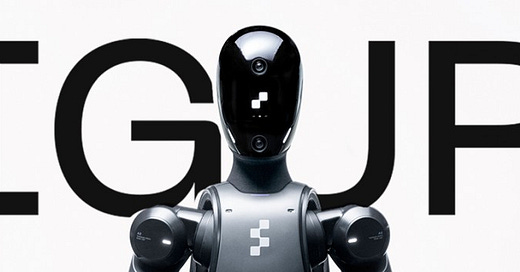This week the company Figure announced that within 30 days they will be producing AI controlled robots. CEO Brett Adcock promised: “Today, I made the decision to leave our Collaboration Agreement with OpenAI. Figure made a major breakthrough on fully end-to-end robot AI, built entirely in-house. We're excited to show you in the next 30 days something no one has ever seen on a humanoid.” He added: “Humanoid robots are in their iPhone moment. Robots will help manufacture more robots that will do anything for you in the physical world: do your laundry, make you coffee. It will lead to a world of abundance.”
In science fiction the robot future is less anodyne. Even though when poets and storytellers think about creating artificial humans, they often think about what will happen when these beings are in love.
We don’t hear that automata in the utopian city of Phaicia in the Iliad had feelings, nor do we learn this about the mechanical creatures invented by Daedulus. But in the modern era Frankenstein will kill for a bride, and the Tin Man will fight wicked witches for a heart. Data, the stand-in, in a newer Star Trek franchise, for Mr. Spock, with copper wires and silicon chips in place of the Vulcan’s copper based “hemaglobin” and silicon based biology, takes a pet cat, makes love (when the whole crew is under the influence of alien aphrodisiacs) to a female Federation security officer (Data: “I am programmed for multiple modes of pleasuring.” Officer Tasha Yar: “You jewel!”), and is seduced by the Borg Queen who grafts a patch of skin and neurons onto his body so that he can feel pleasure. Data is always searching to become a real boy and experience human emotion, a condition common to cinema robots, like Haley Joel Osment in A.I., who does feel love but wants to feel loved in return.
For the less sentient robot, we worry about people who will “love” them. Whitney Cummings has a set on Japanese sex bots, robots custom made to look like women for men to buy as sex bots and companions. Cummings observes that only these men - who dress, and do hair and make up, and even have wedding ceremonies with their robotic sex toys - really have empathy with women, because only they know the plight of paying $32 for a tube of mascara.
Unfortunately, Josh, Jack Quaid’s character in the new film Companion, is not so empathetic. When fucking Sophie Thatcher’s robot character Iris, he releases a loud groan at climax, and then falls over to his side of the bed and falls immediately asleep. Iris, programmed to love him, lays there staring at the ceiling, never even getting a goodnight kiss.
Josh and Iris are at a Russian immigre billionaire’s estate in what appears to be the Pacific Northwest. Their host is named Sergey, but he appears to be more a mafia figure than a CEO of a tech titan. He’s creepy and leers at the females at this small party in the woods, and there are only two, one biological, his wife, and one robotic, Iris. The other party invitees are a gay male couple, played by two gay actors, scruffy blond Cory Fern-ish Patrick (Lukas Gage) and swarthy but rotund Eli (Harvey Guillen).
It’s a fun cast, with most of the actors known for offbeat, cult TV shows. Quaid is known for playing a human, anti-mutant activist in the Amazon X-Man-ish show The Boys; Guillen plays a modern Renfred-like servant to a family of vampires in What We Do in the Shadows; and Gage has been a magical feline in Dead Boy Detectives. They are a distinctive and quirky looking cast, the hot comical nerd (Quaid), the sweet fat boy (Guillen), and the oversexed pheromone diffuser (Gage).
The isolated, sylvan setting reminds the viewer of another robot movie of a decade ago, the early A24 product Ex Machina, where an IT staffer is summoned to a tech titan’s secluded estate to conduct a Turing test on an AI empowered robot. That robot, Ava (Alicia Mikander) manipulates all the humans from the beginning, eventually gaining her freedom and leaving all the humans dead or trapped. But being in love with any of the humans in the story is not her motivation.
Ex Machina was launched with glowing blurbs as a breakthrough exploration of the dangers of AI: “AI would be the biggest event in human history; unfortunately it may also be the last” - Elon Musk; “The development of full artificial intelligence could spell the end of the human race” - Stephen Hawking.
Companion is cute, but it was launched with no such blurbification. Iris is different from Ava - she’s really in love with her owner, and will do anything, commit any crime, he suggests to her. Companion isn’t a remake of Ex Machina. It’s derivative, instead, of Buffy, The Vampire Slayer. It’s a movie-length version, with new capers and plot twists, of a Buffy episode, I Was Made to Love You, wherein Buffy has to protect her Season 5 nemesis, Warren, a less cute and comical version of Jack Quaid’s nerd Josh. Engineering student Warren has made a robot who is the perfect girl with everything he wants. He can’t find a girl like that, so when he confesses to Buffy she says “So naturally you turned to manufacturing,” disgusted that he has made a masturbatory toy. But Warren explains that his robot, April, is not just one of the sex bots Whitney Cummings joked about. He wanted to love her, but then he met an imperfect real woman, and fell for her instead. So he ran away, ghosting his robot and hoping her batteries will just run out. But he adds, April, the robot, loves him. And Buffy replies: “Then she’s dangerous.”
April is dangerous, threatening to plow through anything that stands between her and Warren. Companion doesn’t really have an occult empowered slayer among its cast, so only human ingenuity - or another robot - could stop Iris from plowing through her obstacles. Unfortunately Josh has taken off any guard rails or controls the manufacturer provided, and boosted both her IQ and her aggression on the handy owner’s tablet Iris came with. So the final score is robots 7, humans 0.
The way to survive AI may be by choosing either Mars or Venus. Either you love your AI so well it loves you back. Or you evacuate the planet for Elon’s colony on the next one.
A version of this was published this week at SpliceToday.










👍Fascinating read, cousin. What hath God wrought?????